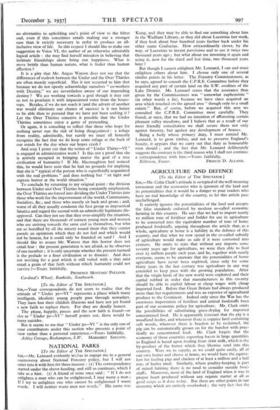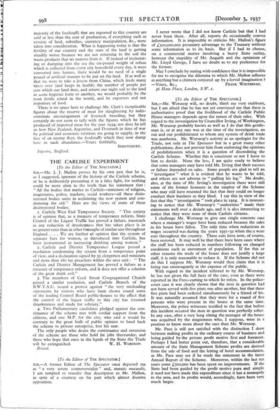AGRICULTURE AND DEFENCE
[To the Editor of THE SPECTATOR.] SIR,—Mr. Colin Clark's attitude is so typical of the well-meaning townsman and the economist who is ignorant of the land and its potentialities that it would be a danger to your readers who have no real knowledge of the country, to let this article pass unchallenged.
It entirely ignores the potentialities of the land and accepts the false standards enforced by modern so-called economic farming in this country. He says that we had to import nearly to million tons of fertiliser and fodder for use in agriculture to be converted into the equivalent number of tons of home produced foodstuffs, arguing throughout the article that, as a whole, agriculture at home is a liability in the defence of this country, and that what we now spend in the so-called subsidy of agriculture would make us safe if it were converted into cruisers. He omits to state that without any imports some seventy years ago for agriculture, we were then able to feed over 25 million people each year, and he, together with nearly everyone, seems to be unaware that the potentialities of home agriculture have never been explored, since only for some thirty years in the last century was agriculture in any way extended to keep pace with the growing population. After that the virgin lands of the new world were exploited and their capital robbed in order that manufacturers in this country should be able to exploit labour at cheap wages with cheap imported food. Before that Great Britain had always produced more than her requirements and was an exporter of agricultural produce to the Continent. Indeed only since the War has the enormous importation of fertiliser and animal foodstuffs been part of our economic policy for agriculture. Mr. Clark omits the possibilities of substituting grass-drying for imported concentrated food. He is apparently ignorant that the pig is a woodland feeder, and wherever there is coppice land containing soft woods, wherever there is bracken to be reclaimed, the pig can be automatically grown on for the butcher with prac- tically no concentrated food. Mr. Clark forgets that the economy of those countries exporting bacon in large quantities to England is based upon feeding from skim milk, which is the by-product of the butter which they likewise send into this country. Were we to supply, as we could quite easily, all of our own butter and cheese at home, we would have the equiva- lent for feeding pigs and chicken of at least a million and a half tons of barley meal. Similarly, where poultry-keeping is part of mixed farming there is no need to consider outside food- stuffs. Moreover, most of the land of England when it was in proper. heart produced without any organic matter at all as goad crops as it does today. But there are other points in our economy which are entirely overlooked ; the very fact t hat the majority of the foodstuffs that are exported to this country are sold at less than the cost of production, if everything such as erosion of land, subsidies, currency manipulation, &c., were taken into consideration. What is happening today is that the fertility of our country and the state of the land is getting steadily worse, because we are not returning to the soil the waste products that we remove from it. If instead of incinerat- ing or dumping into the sea the six-pound weight of refuse which is collected from every city household every day, it were converted into humus, there would be no need of a single pound of artificial manure to be put on the land. If as well as that we were to take a lesson from China, which feeds many times over (and keeps in health) the number of people per acre which our land does, and return our night soil to the land in wine hygienic form or another, we would probably be the most fertile island in the world, and be exporters and not importers of food.
There is no space here to challenge Mr. Clark's inexplicable figures about the reserve of meat for slaughtering by indis- criminate encouragement of livestock breeding, but they certainly do not seem to tally with the figures which he has produced of imported meat for the year 1934, nor does he tell us how New Zealand, Argentine, and Denmark in time of war by political and economic relations are going to supply, in the face of an enemy fleet, the foodstuffs which they now dump here in such abundance.—Yours faithfully, Ingestrc, Stafford.
SHREWSBURY.



























































 Previous page
Previous page